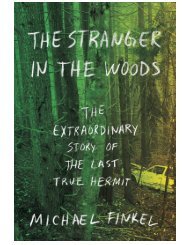Create successful ePaper yourself
Turn your PDF publications into a flip-book with our unique Google optimized e-Paper software.
Chapter 39<br />
KIDNEY FOR SALE!<br />
Ross stood in his bedroom, his white sheets rumpled on the bed, as he buttoned his pink-andgreen-checkered<br />
shirt before heading out on another San Francisco adventure.<br />
Over the past few months he had explored every crevice of the Bay Area. On some days he had<br />
ventured south to Bernal, where he climbed to the peak of a hill. He took long walks past the piers<br />
with sunbathing sea lions. He had gone north with his roommate and best friend, René, over the<br />
Golden Gate Bridge to Marin, where they hiked the trails amid the redwood trees, clambering through<br />
the salty fog and stopping every few feet to marvel at thousand-year-old trees that seemed to almost<br />
touch the heavens. Between explorations Ross went on boating trips with friends through the choppy<br />
waters of the bay, brushing past Alcatraz, the notorious prison that had once been home to Al Capone,<br />
the American gangster who fought the U.S. government during Prohibition.<br />
But one of the more memorable experiences of his time in San Francisco happened on a<br />
Thursday afternoon in early December, when Ross and René happened upon the Contemporary<br />
Jewish Museum in the South of Market area of the city.<br />
Homeless people, mostly drug addicts who had fallen on hard times, lined the streets, pushing<br />
their lives in carts from one soup kitchen or rehab center to the next, past the big glass buildings<br />
where those billion-dollar start-ups grew larger and more powerful by the hour. It was chilly that day,<br />
and a light sprinkle of rain fell from the sky as the two friends walked inside the museum. They<br />
wandered around the brightly lit, cavernous rooms until they came upon a metal box the size of a shed<br />
on whose side the word sTORYcORPS was written in big bubbly red letters. Ross and his friend pulled<br />
open the door to the metal box and sat down in front of two microphones. A red light soon came on to<br />
indicate that what they were about to say to each other was going to be recorded.<br />
Ross began, introducing himself and noting, “I’m twenty-eight years old.” His voice was calm<br />
and crackly.<br />
The recording they were about to make was part of a National Public Radio experiment; the box<br />
they sat in would travel the country, enticing Americans to tell their stories for posterity, to try to<br />
capture the change the United States was going through at the time. Some of the recordings people had<br />
already done in other parts of America were sad, like the two parents who told the story of their<br />
young son who had died because he couldn’t get a bone marrow transplant for a fatal disease.

















